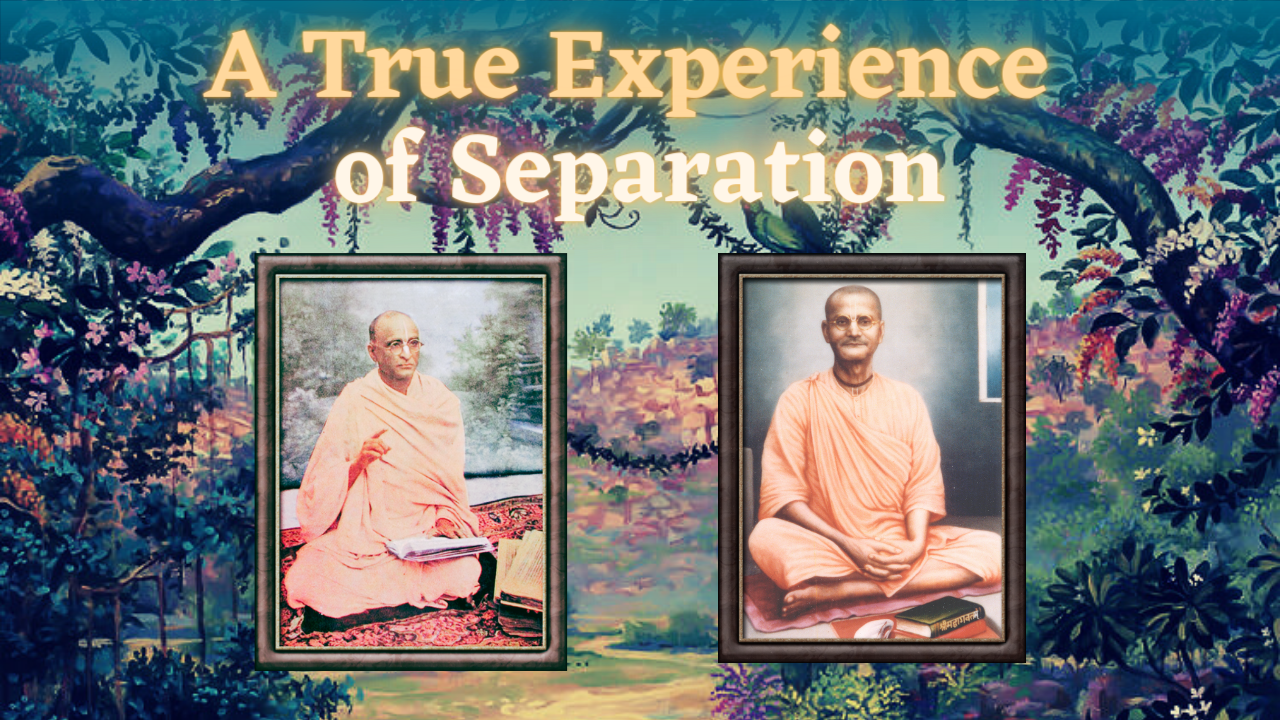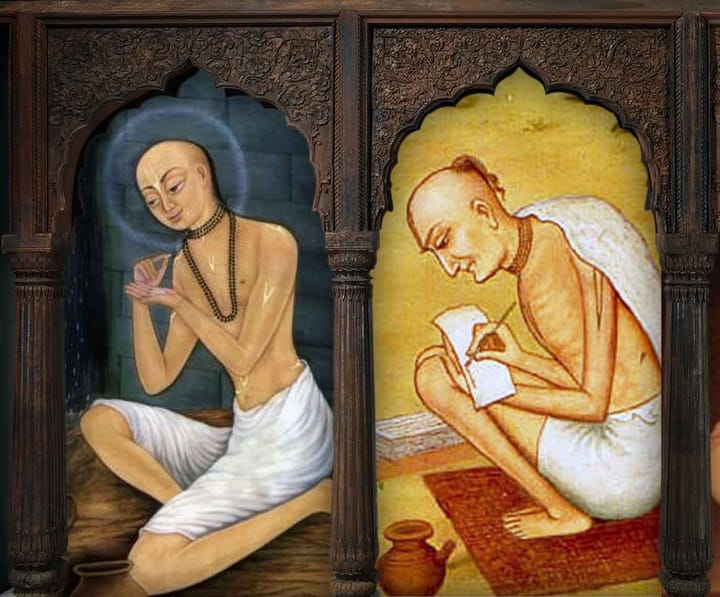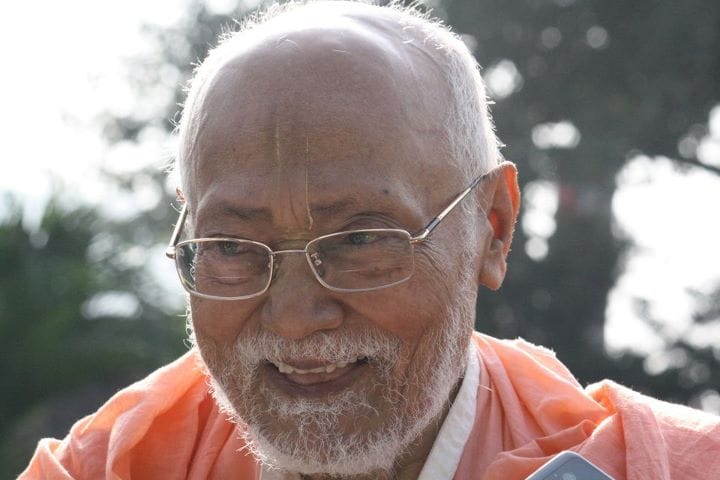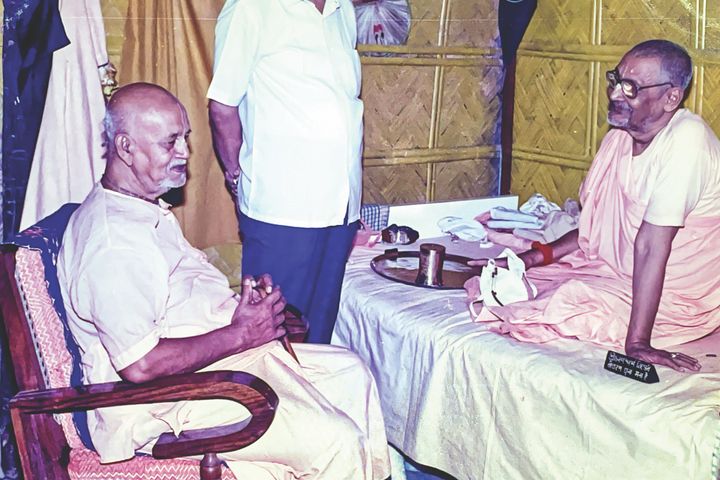A True Experience of Separation

from a speech given by
Śrī Śrīmad Bhakti Prajñāna Keśava Gosvāmī Mahārāja
on the disappearance day of
Śrī Śrīmad Bhaktisiddhānta Sarasvatī Gosvāmī Mahārāja
at Śrī Uddhāraṇa Gauḍīya Maṭha, Chuchura,
on 5 December 1952
Hear this article on the YouTube video I made below:
Appearance and disappearance have the same purpose
The Vaiṣṇavas’ appearance in this world and their disappearance from it are one and the same. Both their arrival in this world and departure from it signify their mercy. Compelled by mercy, they come to this world, and it is for mercy’s sake that they also leave it. All of the activities of Vaiṣṇavas are imbued with mercy. “Vaiṣṇava caritra sarvadā pavitra – the life and character of Vaiṣṇavas are pure in all respects.” Imparting divine bliss is the purpose of their lives. Still, those gripped by misfortune and compelled by temporal pleasures perceive their lives to be devoid of any joy. This is but the influence of māyā.
If we think that Vaiṣṇava Ṭhākura has departed from this world and dropped us in an ocean of sorrow, then we are attributing fault to his character. But why would he inflict pain upon us? He does not know how to give pain to anyone. This is why the term viraha-utsava (“a festival of separation”) came to be used in Vaiṣṇava literature. The word utsava refers to that which yields happiness and love, not joylessness or sorrow.
The Vaiṣṇavas’ purpose for appearing in this world is not temporal. It has not even a shadow of impermanence. The Vaiṣṇavas are eternal and their practices are also eternal. Their appearance ensures the distinct speciality of their disappearance, and their disappearance increases the sweet charm of their advent.
The sweetness of their appearance and the magnanimity displayed in their disappearance manifest in this world the literature and chronicles of Vaiṣṇava saints. This literature is the blossoming of śabda-brahma (the divine word), where the filthy shadow of the ordinary word cannot penetrate.
Śrīla Prabhupāda is Siddhānta Sarasvatī (siddhānta meaning “the perfect conclusion” and sarasvatī meaning “the goddess of knowledge”). That is to say, he is the elaboration of the inner conception of the divine temple of the Vaiṣṇava message.
Today is Śrīla Prabhupāda’s holy disappearance day. We do not attribute any sort of fault to this holy day or view Śrīla Prabhupāda’s suprahuman, auspicious activities negatively. With great respect, Śrī Gauḍīya Vedānta Samiti welcomes this occasion (tithi) every year. It is a matter of great delight that again this year you have all eagerly assembled to worship this day.
Vaikuṇṭha-darśana
To view happiness and distress equally is actually vaikuṇṭha-darśana. In such vaikuṇṭha-darśana, one perceives uniformity in every object and entity. At the same time, this equality is full of distinctiveness.
Worldly inequities are not found in the divine realm. In this world, happiness and distress are opposites. In the transcendental world, these same conflicting forces produce a divine, mutual uniformity, replete with unique specialities. Happiness and sadness dwell either side of a single path. They advance from opposite directions at the same pace till they meet at a point in the middle.
This middle ground is called sambhoge vipralambha (separation in meeting) and vipralambhe sambhoga (meeting in separation). Śrī Gaurasundara Himself is the presiding deity of this juncture. Āvirbhāva and tirobhāva are the representations of sambhoga and vipralambha.
The apprehension of separation experienced at the moment of meeting increases the intensity of union. The deeper the worry of impending separation that arises in one’s heart during meeting, the sweeter the bourgeoning flavour of meeting. Likewise, the more acute the impact of meeting, the more the endless current of vipralambha-rasa inundates the heart with separation. Such phenomena are illuminated in the life and character of supremely liberated personalities.
Sadness in the absence of a Vaiṣṇava does not constitute separation from him
We were attracted by Śrīla Prabhupāda’s supramundane potency, and we narrate his supramundane activities through kīrtana. Not everyone’s concept or perception of the supramundane is the same. One can only grasp a supramundane character to the extent that one is immersed in a supramundane disposition. Our tendency to be self-indulgent, our thirst to gratify the senses and our desire to search for happiness do not facilitate a grasp of the supramundane conception.
Whatever longing in separation (viraha) we may express via the above-mentioned impulses is but a reflection of enjoyment (bhoga). The displeasure we experience when our enjoyment is curtailed cannot be called viraha. If that were the case, then the antonyms of bhoga – tyāga (abstinence) and vairāgya (detachment) – would be referred to as viraha. Though abstinence and detachment appear spontaneously in the character of one who is experiencing separation, they do not constitute viraha in and of themselves.
We experience separation when our pleasure is obstructed. As we beheld Śrīla Prabhupāda’s charming and handsome figure, his sweet, gentle smile, his simple and generous dealings, his world-conquering unparalleled scholarship, his natural inclination to constantly speak hari-kathā and perform kīrtana and other such qualities, we became enchanted by him. We delighted in his compassion and affectionate ways. Even veteran intellectuals were exceedingly delighted by his views and reasoning. It is only natural, therefore, that those who were enchanted by all these qualities of Śrīla Prabhupāda and drawn to him should now experience sadness in his absence. But I want to say that this is an experience of thwarted pleasure rather than viraha. Gurudeva was a good person, his dealings were nice, he used to help us so much and make us so happy. That is why we liked him so much. The sadness we now feel in his absence because we are not getting those things is merely kāmanā (lust, or desire) and bhoga (enjoyment).
Separation is only experienced through self-surrender
From the moment of our birth, we carry out our life according to various notions of good and bad, as dictated by our previous karma. We derive much of this conception of morality from our atmosphere and environment. From this assortment of acquired tendencies, we create certain perceptions of sainthood, which in reality are not sainthood. Sainthood is determined by service attitude. As long as there is service (sevā), there is devotion (bhakti). The mundane atmosphere and environment have no authority over bhaktior sevā. The moment Śrīla Prabhupāda saw a tendency for devotion or service in a person, he would reveal his identity to him. Otherwise, his identity was always concealed from the external world. The dominant characteristic of bhakti is śaraṇāgati, or surrender. Śaraṇāgati is to relinquish our presumed identity, or the idea that we belong to ourselves.
Śrīla Prabhupāda informed us “One will have to become a devotee and one will have to obtain bhakti.” One will receive gurudeva’s genuine mercy to the extent that one has offered him one’s self. We hope to derive happiness and comfort from our relatives and friends. We wished for these things even from Śrīla Prabhupāda, and received them also. But those factors do not produce a true experience of separation. It is surrender of the self (ātma-samarpaṇa) that determines separation. Ātma-samarpaṇa means to fully offer what one considers to be “I” and “mine”. That is why to hope for any sort of worldly possession, ideology or action from gurudeva is not characteristic of ātma-nivedana. Bhakti is to instantly offer whatever we happen to think is ours to the lotus feet of śrī gurudeva.
A person could wonder: “Why is it not ātma-nivedana to get something from gurudeva and offer it back to him?” But what is the point of taking something from guru and giving it back? In accounting terms this is much the same as a deposit and withdrawal. In other words, one might think, “Since I gave my everything to Gurudeva, my balance went to zero. I then took one thousand rupees from him, which brought my balance to a thousand. Again, I gave those thousand coins to Gurudeva, and now I am left with zero. When I collected a thousand rupees from Gurudeva and returned it to him, my balance came to zero, just as when I first surrendered everything to him and had nothing, zero. (0 + 1,000 = 1,000 – 1,000 = 0.)”
Though both equations are equivalent in mathematical terms, really, they are not the same. If you think about it, you will see there is a huge iniquity. It is uncharacteristic of a surrendered devotee to try to solicit anything from guru. Moreover, the guru-sevaka will have to suffer the result of any trouble his gurudeva willingly undergoes in an effort to fulfil his disciple’s wish. As such, to derive personal gain from the lotus feet of gurudeva is extremely damaging for the guru-sevaka. Only the desire to nurture love for the lotus feet of guru will destroy other aspirations and is characteristic of a surrendered soul.
Understanding Śrī Gurudeva’s heart
Esteemed and prominent sannyāsīs and brahmacārīs could not comprehend Śrīla Prabhupāda’s heart, despite toiling day and night. We had the opportunity to witness this during his manifest presence. How can one ever understand the heart of a supramundane personality without even considering the consciousness needed to do so? The guru-sevaka’s exclusive duty is to proceed in accordance with what is on gurudeva’s mind.
We might think, “Gurudeva has a dire lack of funding and needs a great deal of manpower. If somehow or other we collect some money and give it to him, we may be able to grasp Prabhupāda’s mind.” Or, we conclude, “Festivals require a great deal of physical labour, so only if we exert ourselves physically day and night [in preparing a festival] will we be doing service.”
But if money and manpower cannot complete an immortal personality’s efforts to serve Kṛṣṇa, then how can they enable us to comprehend gurudeva’s mind? To grasp gurudeva’s mind, one will have to identify his deepest, independent inner desires and render all sorts of services accordingly. Only those who had the opportunity to flawlessly contemplate his deepest service dispositions during his manifest presence are truly blessed. Imposing our own presumptions of what constitutes śrī guru-pādapadma’s service will never be considered service. Whatever effort we make under the assumption that our perspectives are one with gurudeva’s does not constitute service, but rather a kind of autosuggestion.
There is no point in imposing notions that belong to the terrestrial world on the transcendental world. By striving to do so, we deviate from the true path. Indications how to truly serve manifest in the sevaka’s heart from the realm of Vaikuṇṭha.
While assuming a proclivity to enjoy, whatever efforts we exhibit to serve are rooted in a desire for sense gratification. And if we try to check those tendencies, a sense of detachment sprouts that is mundane. This does not slightly constitute actual service. During Śrīla Prabhupāda’s time, we had the opportunity to witness the fact that one cannot satisfy gurudeva’s mind even by labouring tirelessly day and night with simple-hearted intent. Only someone who understands the difference between śrī gurudeva’s internal instructions and his external instructions, or his worldly guidance, and acts accordingly can attain true auspiciousness.
What qualities endear one to Śrīla Prabhupāda?
Jagad-guru Śrīla Prabhupāda had a sannyāsī disciple (Bhakti-vilāsa), who is no longer present. We never observed him displaying any worldly skill in his life. Some of his peers, high-status sannyāsī teachers and speakers, cast aspersions on his [apparent] inactivity a couple of times. Śrīla Prabhupāda, roaring like a lion, strongly corrected them.
“I am a big orator. I am a very good instructor. I can captivate everyone with my classes and speeches. I have so much capability. So many people are coming to the maṭha due to my lectures. I am therefore a prominent and dear disciple.” Śrīla Prabhupāda never considered those with such a mentality to be exalted servants. The aptitude for bhakti is something else. It is only attained by extreme good fortune.
In observing the life and conduct of Śrīla Prabhupāda, we saw several seemingly contradictory incidents.
We saw that someone conversant in all the scriptures, adored by scholars and the veritable sun of philosophical truths had accepted a completely illiterate personality as his guru.
We worship Prabhupāda as the personification of the divine message (vāṇī), and yet when one of the main assistants in his vāṇī-vilāsa-līlā (preaching pastimes), a particularly bright writer, was overwhelmed by a weakness of heart and suddenly left the maṭha to go to Dhaka, Prabhupāda was not in the least perturbed. On the other hand, he would become extremely anxious if one of his servants, whose name was Pañcānana and who happened to be illiterate, went out of his sight for even a moment. This seems quite startling and perplexing, but in reality, it is not, even slightly. These interactions reveal the full current of the nature of bhakti. Unlimitedly greater than service to Prabhupāda by moving a pen, which brought about a revolution in the world, is the service propensity of an illiterate person’s heart-felt affection for him. The root fibre of the aptitude for bhakti is attachment to the lotus feet of śrī guru.
The characteristics of service to guru
We have seen many exhibit great enthusiasm for reading from the scriptures, performing kīrtana, delivering lectures, writing essays and articles, and publishing books, because a hankering for material gain, worship and prestige corrupted their minds. If, in the course of serving śrī guru, we fail to receive something in return, at least some praise and prestige, then we stop serving him. In the name of wanting encouragement from gurudeva, we forever hanker for prestige. This in truth is not characteristic of service to guruor surrender. The more one is attached to gurudeva, the more one qualifies as his servant.
We receive instruction from the following song of themahājanas: “viṣaye je prīti ebe āchaye āmāra, sei mata prīti hau caraṇe tomāra – May I love You the way I now love the objects of the senses.” We regard the illusory objects of the senses as ours. Our attachment to them is such that if they leave our field of vision for a mere moment, we feel extreme discomfort. How can we possibly attain Bhagavān’s mercy if we do not develop that sense of possessiveness for the things that are used in the service of Hari, Guru and Vaiṣṇavas? “If the belongings of Hari, Guru and Vaiṣṇavas are getting destroyed, so be it, as long as my own belongings are fine.” This sort of disposition is not considered indicative of a service mentality. A true servant of Hari, Guru and Vaiṣṇavas thinks, “Let all the resources of this illusory world go to ruin, but I will not let even a single particle of any object that is used in the service of Hari, Guru and Vaiṣṇavas be destroyed.”
Complete and incomplete objects
Once, Śrīla Prabhupāda, whose disappearance day it is today, was in Bahram Ganj, a town in the Faridpur district (Bangladesh), delivering a lecture to an assembly of thousands of people. He said, “I can support the destruction of millions of conditioned souls in order to protect a single cowrie belonging to Bhagavān.” This was thirty-two years ago. When I heard this, tremendous agitation took over my heart. What had I just heard in open assembly from the mouth of this great personality? He had been a vegetarian all his life and had firmly vowed to establish all living entities in the transcendent laws of non-violence. This struck me as extremely revolting, but in truth, it was a profound statement that captured the essence of the Vedas, Vedānta and Upaniṣads.
Books dealing with mathematics state that “plus one” is greater than minus any large amount or infinity. That is, millions and millions of negative integers are still less than a single positive one. Similarly, this illusory world is constructed of transience and deficiency. Therefore, it is always a negative quantity. On the other hand, the transcendental realm, beyond this Earth, is whole. In that place, a single grain of sand is whole and complete. No illusory deficiency can enter that realm.
It follows then that a single cowrie belonging to Hari, Guru and Vaiṣṇavas is a whole and complete object and infinitely greater than billions and billions of imperfect entities in this destitute material realm. Indeed, this teaching has been verily exhibited in the supramundane life of one from the transcendental world. There is no shortage of correlations of this truth in this world either. A king or leader of a nation does not hesitate to sacrifice the lives of hundreds of thousands of soldiers to fulfil his own aims. Commanders and soldiers sacrifice their very lives to fulfil their leader’s wishes.
Love for the Vaiṣṇavas and service to them
Just see what the life of a soldier entails! For a meagre monthly stipend that facilitates a bit of fleeting mundane pleasure for his spouse, children, parents, siblings and friends, he is ready and willing to relinquish his own life. In a moment, he can abandon the love and attachment of his mother, father and relatives and is determined to give his life. To what extent do we do that for Śrī Hari, Guru and Vaiṣṇavas? The love of sādhus, guru and Vaiṣṇavas affords us the wealth of true happiness for all time, yet we are not prepared to accept even a drop of difficulty for their sake, not to speak of giving up our life for them. Is this the sign of a servant of Hari, Guru and Vaiṣṇavas? How magnanimous, how tranquil, how great are the hearts of those who do not hesitate even slightly to relinquish their life for the service of Vaiṣṇavas! At the moment of truth, we can assess how much love a sevaka has for Hari, Guru and Vaiṣṇavas.
If someone among us were to contract a contagious or infectious disease, we would realize the extent of our love for Vaiṣṇavas. We would not think twice before immediately abandoning that Vaiṣṇava and going as far away as possible, for fear of contracting the disease or losing our own life, thus revealing the degree of our attachment to this package of pus, blood and flesh, which today or after a hundred years, will certainly perish. We are always saying in discourses, recitations and kīrtana that this body is nothing and this mind is nothing, but in reality, that is all we deem important. If what we say is not matched by what we do, then we are wasting our words and misleading people, and what is the use of that? Adherence to the truth is a pre-eminent quality of a Vaiṣṇava. We are always saying that we must give our life to the Vaiṣṇavas, we must offer our everything to the Vaiṣṇavas, and whatever we do we must do for the service of the Vaiṣṇavas. Will all this remain confined in a mere arrangement of words? Once, a person stood ready to give his life for the service of the Vaiṣṇavas and then some heretic hindered him and he fell down. This too we have witnessed.
This morning you heard the song “jaya-re jaya-re jaya, paramahaṁsa mahāśaya.” You must always note the event indicated in the following line: “kuliyāte pāṣaṇḍīrā,atyācāra kailo jārā, tā’ sabāra doṣa kṣamā kori – you forgave the rogues of Kuliyā despite the atrocities they committed.” I am remembering the incident in Kuliyā hinted at in this couplet.
It was during Śrī Navadvīpa-dhāma parikramā. To test his servitors’ propensity to serve, jagad-guru Śrīla Prabhupāda, who was on his way to Cāmpāhāṭī with a large group of pilgrims, arrived at Navadvīpa-Kuliyā town. That was some twenty-five years ago. At the time, Śrīla Prabhupāda’s preaching of pure Vaiṣṇava dharma exposed the religious exploitation and corruption of Kuliyā’s blasphemous hypocrites and provoked their hatred. They came up with a plot and unleashed a horrendous atrocity against him in the parikramā party at Pauḍhā Mā Talā. Calamities vanish by the mere will of the Vaiṣṇavas, but the prime purpose for the ācārya’s appearance is to reveal to the world the glories of sevya (the served) and sevaka (the servant). Therefore, in the midst of the destructive dance of Kali, Śrīla Prabhupāda hid himself in a liquor merchant’s house and examined his sevakas’ anguish and attachment [in relation to him]. In this terrible situation, apart from one or two persons, all of Śrīla Prabhupāda’s renowned so-called servants fled for their lives. Thousands of thugs had surrounded the house where Śrīla Prabhupāda had taken refuge. In that moment, one of his servants exchanged garments with Śrīla Prabhupāda, extricated him from the ring of thugs closing in on them, and safely brought him in disguise back to Māyāpura.
Perilous circumstances reveal the true nature of a guru-sevaka. Those who were famous in the world as guru-preṣṭha (dear to guru), prabhu-preṣṭha (cherished by Prabhupāda) or ācārya-preṣṭha (the ācāryas dearest), who never hesitated to introduce themselves as his exclusively dedicated associates or who wanted to take pride in being managers of the maṭha mission and his primary assistants, did not show up in that evil hour to display the pinnacle of service to guru. A guru-sevaka’s exclusive duty is to give his life in the service of his guru. Do not maintain a conception that such pastimes of the ācārya are indicative of his being a mere mortal. Events like these in fact serve to reveal his supra-human glory.
You may recall hearing of a similar event in the life of Ācārya Śrī Rāmānuja. A Śaiva king became so envious of his effective preaching of Vaiṣṇava dharma that he tried to kill him. Ācārya Śrī Rāmānuja’s devoted and prominent disciple Ācārya Kureśa then saved his guru’s life by disguising Śrī Rāmānuja in the clothes of a lady. Similarly, Ācārya Śaṅkara was once attacked by a Kapālika sect, but Ācāryā Padmapāda protected him. Thus, in every ācārya’s pastimes, many kinds of calamities occur which serve to demonstrate his supra-human nature. And, on the other hand, the gradations of sevakas that become evident are lessons for the souls of this world. That is why I say, in such circumstances alone, the true measure of a sevaka’s inclination to serve is revealed.
Translated from Śrī Gauḍīya-patrikā,
Year 4 Issues 11 & 12
by Rays of The Harmonist team
for the book Kṛti-ratna



Comments ()